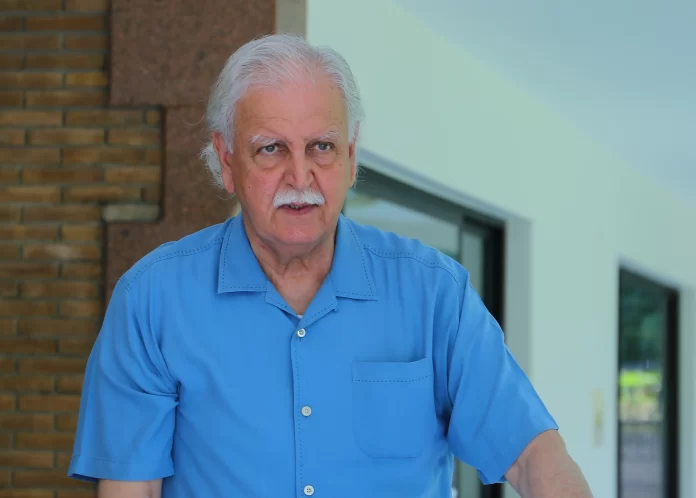Anwar Saifullah is a distinguished statesman, businessman, and reformist whose career spans decades of service in politics, industry, and governance. As a former Minister, he played a pivotal role in shaping Pakistan’s energy policies, while his leadership in business helped drive economic growth. In this exclusive interview, he talks to us about his life, joys, challenges, and the experiences that shaped his journey. His story is one of resilience, discipline, and an unwavering commitment to nation-building.
With a deep sense of respect for discipline and hard work, instilled in him through his schooling years, Saifullah grew into a man who embraced challenges head-on. His years abroad—both in academia at Oxford and later as Pakistan’s Consul General in Montreal—broadened his worldview and sharpened his understanding of governance, eventually setting the stage for his transition from bureaucracy to business and, ultimately, politics.
Despite hailing from a politically influential family, Anwar Saifullah’s foray into electoral politics in 1988 was more coincidental than deliberate. Winning a National Assembly seat under Benazir Bhutto’s leadership, he quickly adapted to the shifting dynamics of a young democracy. However, his structured and methodical governance style clashed with the evolving political landscape, prompting a temporary retreat. Returning in 1995 as Minister for Petroleum and Natural Resources, he made a lasting impact by spearheading Pakistan’s first mineral policy and securing the Iran-Pakistan gas pipeline project. His tenure emphasized long-term economic and energy reforms over short-term political gains, showcasing his commitment to pragmatic and strategic policymaking.
Anwar Saifullah’s leadership is defined by impact-driven decision-making across business, civil service, and politics. His journey is one of adaptability—stepping away when principles clashed with political realities and returning to drive meaningful change. Guided by his mother’s influence, he upheld integrity alongside ambition, setting a rare example of purposeful leadership in an era often shaped by self-interest.
MT: Of the four major roles you’ve held—civil servant, politician, businessman, and diplomat—which one would you say has allowed you to thrive the most?
AS: “That’s a great question. By circumstance, I was born into a political and business family. My family was involved in land and agriculture, but we were also pioneers in industry. My mother was one of the first women to establish a textile mill in the late 60s, the Quahar Textile Mill, a remarkable achievement for a widow back then. So, my roots were always in both politics and business.
As for thriving, if I had the chance today, I would focus more on business. I would want to be my own boss, run my own company. Business, despite the obstacles, gives you the most freedom. It has allowed me to do things for the betterment of Pakistan, like bringing Mobilink to the country, which changed the telecommunications landscape here.”
MT: You’ve spoken about your business ventures and the challenges you’ve faced. Could you elaborate on how your journey as a businessman has been marked by adversity?
AS: “Well, business in Pakistan isn’t always easy. If you succeed, people question how you made your money. I started my journey in business almost 30 years ago, and yes, it was tough. As a businessman, I faced accusations simply for creating jobs. I was even jailed for a year and a half for providing jobs, which, mind you, I did legally.
I remember telling a judge during my trial, ‘If I get another opportunity, I will give ten times more jobs.’ And, you know, it wasn’t about giving jobs to people from India—it was about supporting our own people. These are the challenges you face when you try to create a business that benefits Pakistan.”
MT: That sounds like a difficult period. How did you overcome the adversity?
AS: “Honestly, it was a mix of resilience and a bit of luck. Even in tough times, I believed in what I was doing. When I was sentenced, I didn’t feel wronged. Instead, I thanked the judge for not accusing me of corruption. He only reprimanded me for giving jobs, which is something I can live with. The truth is, I wanted to create oppor-tunities, and I’m proud of what we achieved.
Later, I had the chance to meet that same judge after he retired, and we discussed the case. It was clear that he was under pressure, but we were able to move past that. It’s all part of the game in this country.”
MT: You’ve spoken about giving back to society, particularly through job creation. How do you feel about the impact of your work?
AS: “It’s something I’m immensely proud of. When I brought Mobiling to Pakistan, we created thousands of jobs. Today, many of those young men and women who worked with us are in high positions abroad, earning well, living better lives. The same goes for the 30,000 young Pakistanis I helped secure jobs at BBC. These are all small but significant contributions to the country’s development.
Whether it was in the tech sector or through providing opportunities to the youth, it’s fulfilling to see how far they’ve come. I’ve always believed that giving people jobs gives them dignity, and that’s what we’ve done.”
My advice is simple: take calculated risks. Business is about seizing opportunities, but also being mindful of the environment around you.
MT: You’ve also been involved in major projects like the Iran gas pipeline deal and other key initiatives. What drives you to continue taking risks?
AS: “It’s about doing things that make a real difference. For example, when we worked on the Iran gas pipeline deal, it was not just a business venture—it was a step towards improving Pakistan’s energy sector. I’m not afraid to take risks if they benefit the people of Pakistan. Yes, we took risks with Motorola, for example, when GSM was just coming in, and people were skeptical. But it worked, and it changed the communications landscape here.
For young businessmen, my advice is simple: take calculated risks. Business is about seizing opportunities, but also being mindful of the environment around you. If I were to advise a young person today, I would say: ‘Look at IT. It’s the future.’ But remember, not everyone can afford to take big risks, so build your resources first before making a leap.”
MT: As a businessman and a politician, you’ve seen firsthand the challenges facing Pakistan. What’s your vision for the country’s future, especially for the youth?
AS: “Pakistan has immense potential, but we need to make sure we don’t let the political environment deter us from progress. The youth must be given opportunities to grow and thrive. Whether it’s through technology, education, or business, we need to focus on creating an environment where they can succeed.
My hope is that the next generation of Pakistanis doesn’t have to face the same hurdles I did. We need to create industries that are future-ready and ensure our youth has access to the best possible education and opportunities. Only then will we truly move forward as a nation.”
MT: How do you view the role of the expatriate community in Pakistan’s future?
AS: “Expatriates are critical to our economy. They send money back home, they invest in businesses, and they help promote Pakistan’s image abroad. That’s why I’ve set up the 18-project initiative for expats, to provide them with a secure way to invest in Pakistan.
We’ve always seen how the expatriate community struggles when dealing with property or land issues. By creating transparent, trustworthy platforms, we’re trying to make things easier for them. They contribute so much to our economy, and it’s only fair that we offer them opportunities that don’t come with hidden traps.”






